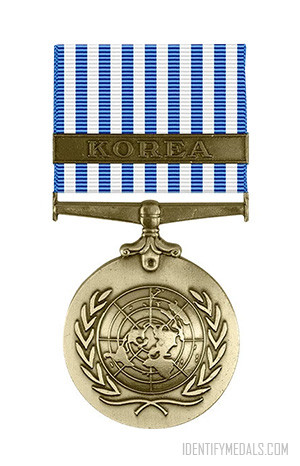Medals from the United Nations
Explore awards, badges, and military medals awarded by the United Nations (UN) for participation in joint international operations.
The United Nations Medal holds significant prestige as an international decoration conferred by the United Nations (UN) to member countries’ military and police personnel who have participated in joint international operations. These operations encompass a wide range of endeavors, including peacekeeping missions, humanitarian efforts, and disaster relief initiatives. As a service medal, the UN Medal is highly regarded within military and police forces worldwide, symbolizing the commitment to upholding the principles of the United Nations and promoting global peace and security.
A (Very) Brief History of The United Nations Medal
Over the years, the United Nations has undertaken numerous peacekeeping and humanitarian operations in regions beset by conflict, instability, and natural disasters. Military and police personnel from member countries have played crucial roles in these missions, providing security, facilitating humanitarian aid, and promoting stability and reconciliation in volatile environments.
Initially awarded for participation in joint international military actions, such as peacekeeping missions and humanitarian efforts, the UN Medal gained prominence for its role in recognizing the contributions of military and police personnel from member countries. The UN Korea Medal, awarded for service during the Korean War (1950–1953), marked the first instance of the UN bestowing medals to honor multinational forces’ contributions to peace and security. This historic medal set a precedent for future UN Medals, establishing a tradition of acknowledging personnel’s service in UN missions worldwide
The UN Medal serves as a tangible expression of gratitude and recognition for the dedication, professionalism, and sacrifices of these personnel in the pursuit of international peace and security.
All the UN Medals and Their Operations
The prevalent United Nations decoration, widely recognized as the United Nations Medal, stands as the most frequently awarded UN honor. This medal is commonly conferred by numerous nations to recognize military personnel’s involvement in collaborative UN endeavors, irrespective of the specific nature of the action.
Each United Nations mission has its own unique medal design, reflecting the specific context and objectives of the operation. However, all UN Medals share common characteristics, such as the UN emblem and inscription, symbolizing the organization’s mandate to promote peace, cooperation, and solidarity among nations.
All the UN Medal Ribbons
In many countries, the standard United Nations Medal serves as a substitute for campaign-specific medals. Typically, each operation employs a distinct ribbon to represent its mission, though there have been exceptions to this practice.
Here’s a list of all ribbons, their year, and and the corresponding operations:
| Years | Ribbon bar | Operation | Operation area |
|---|---|---|---|
| 1948– | UNTSO | Middle East | |
| 1949– | UNMOGIP | India, Pakistan | |
| 1958 | UNOGIL | Lebanon, Syria | |
| 1960–1964 | ONUC | Congo | |
| 1962–1963 | UNSF | West Papua and Indonesia | |
| 1963–1964 | UNYOM | Yemen | |
| 1964– | UNFICYP | Cyprus | |
| 1965–1966 | No mission medal | DOMREP | Dominican Republic |
| 1965–1966 | UNIPOM | India, Pakistan | |
| 1973–1979 | UNEF II | Egypt, Israel | |
| 1974– | UNDOF | Golan Heights | |
| 1978– | UNIFIL | Lebanon | |
| 1988–1991 | UNIIMOG | Iraq, Iran | |
| 1988–1990 | UNGOMAP | Afghanistan, Pakistan | |
| 1988–1991 | UNAVEM I | Angola | |
| 1989–1990 | UNTAG | Namibia | |
| 1989–1992 | ONUCA | Central America | |
| 1991–2003 | UNIKOM | Kuwait, Iraq | |
| 1991– | MINURSO | Western Sahara | |
| 1991–1995 | UNAVEM II | Angola | |
| 1991–1995 | ONUSAL | El Salvador | |
| 1991–2003 | UNGCI | Iraq | |
| 1991–1992 | UNAMIC | Cambodia | |
| 1992–1995 | UNPROFOR | Croatia and Bosnia and Herzegovina during the Yugoslav Wars | |
| 1992–1993 | UNTAC | Cambodia | |
| 1992–1993 | UNOSOM I | Somalia | |
| 1992–1994 | ONUMOZ | Mozambique | |
| 1993–1995 | UNOSOM II | Somalia | |
| 1993–1994 | UNOMUR | Rwanda, Uganda | |
| 1993–2009 | UNOMIG | Georgia | |
| 1993–1997 | UNOMIL | Liberia | |
| 1993–1996 | UNAMIR | Rwanda | |
| 1993–1996 | UNMIH | Haiti | |
| 1994 | No mission medal | UNASOG | Libya, Chad |
| 1994–2000 | UNMOT | Tajikistan during civil war | |
| 1995–1997 | UNAVEM III | Angola | |
| 1995–1999 | UNPREDEP | Macedonia |
| Years | Ribbon bar | Operation | Operation area |
|---|---|---|---|
| 1995–1996 | UNCRO | Croatia | |
| 1995–2002 | UNMIBH | Bosnia-Herzegovina | |
| 1996–1998 | UNTAES | Croatia | |
| 1996–1997 | UNSMIH | Haiti | |
| 1996–2002 | UNMOP | Croatia | |
| 1997 | MINUGUA | Guatemala | |
| 1997–1999 | MONUA | Angola | |
| 1997 | UNTMIH | Haiti | |
| 1997–2000 | MIPONUH | Haiti | |
| 1998 | UNPSG | Croatia | |
| 1998–2000 | MINURCA | Central African Republic | |
| 1998–1999 | UNOMSIL | Sierra Leone | |
| 1999– | UNMIK | Kosovo | |
| 1999 | UNAMET | East Timor | |
| 1999–2005 | UNAMSIL | Sierra Leone | |
| 1999–2002 | UNTAET | East Timor | |
| 1999–2010 | MONUC | Democratic Republic of the Congo | |
| 2000–2001 | MICAH | Haiti | |
| 2000–2008 | UNMEE | Eritrea, Ethiopia | |
| 2002–2005 | UNMISET | East Timor | |
| 2003–2018 | UNMIL | Liberia | |
| 2003–2004 | MINUCI | Ivory Coast | |
| 2004–2018 | UNOCI | Ivory Coast | |
| 2004–2017 | MINUSTAH | Haiti | |
| 2004–2006 | ONUB | Burundi | |
| 2005–2011 | UNMIS | Sudan | |
| 2006–2012 | UNMIT | East Timor | |
| 2007–2020 | UNAMID | Sudan | |
| 2007–2010 | MINURCAT | Central African Republic, Chad | |
| 2010– | MONUSCO | Democratic Republic of the Congo | |
| 2011– | UNISFA | Sudan | |
| 2011– | UNMISS | South Sudan | |
| 2012 | UNSMIS | Syria | |
| 2013– | MINUSMA | Mali | |
| 2014– | MINUSCA | Central African Republic | |
| 2017–2019 | MINUJUSTH | Haiti | |
| 1974– | UNHQ | For service in the United Nations Headquarters |

